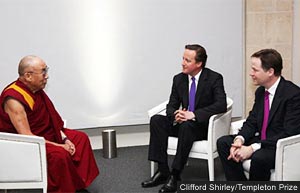- On May 14, the Dalai Lama met British Prime Minister David Cameron and his deputy in the ruling coalition, Nick Clegg. In response to the stormy reaction from Beijing to the meeting, the British government said that it was up to the Prime Minister and Deputy Prime Minister to choose with whom they meet.
- Earlier in the day, the Dalai Lama received a major award, the Templeton Prize, in a ceremony at St Paul’s Cathedral. The prize was awarded in recognition of the Dalai Lam’s achievements in spirituality and science. The Dalai Lama became the second person with Mother Teresa to be honored with both the Nobel Peace Prize and Templeton Prize, which while lesser-known is the largest single annual financial award given to an individual by a philanthropic organization.
 The Dalai Lama meeting David Cameron and his deputy, Nick Clegg.  The Dalai Lama receiving the Templeton Prize from John Templeton, St. Paul’s Cathedral, London, May 14, 2012. |
The Dalai Lama’s meeting with the British Prime Minister, characterized as “private,” was swiftly condemned by the Chinese Foreign Ministry that warned that British leaders should fully consider the “serious consequences” of meeting the Dalai Lama. Chinese Vice Foreign Minister Song Tao reportedly summoned the British ambassador in Beijing to complain about the meeting, saying that it “seriously interfered” with China’s internal affairs. Nonetheless, the British government defended the meeting, with a spokesperson saying: “The Dalai Lama travels all over the world. He has visited the UK on several occasions and met with previous prime ministers. It is for the prime minister and deputy prime minister to choose who they see. The Dalai Lama is an important religious figure and advocate for peace and the prime minister regularly meets with such figures.” (AFP, May 15).
The Templeton Prize awarded in the name of the late American-born British entrepreneur and philanthropist Sir John Templeton, comes with a cash award of almost $2 million. The Dalai Lama announced publicly that he would be giving all the money away, with $1.5 million to support the Save the Children Fund to address the problems of malnourishment among children in India. In the spirit of the award’s focus on his “exceptional contribution to affirming life’s spiritual dimension, whether through insight, discovery, or practical works,” the Dalai Lama also donated $200,000 to the Mind and Life Institute, and $75,000 to funding his ongoing efforts to introduce formal modern science education to monk students in the various Tibetan monastic universities. The full ceremony, including the hour-long media panel that preceded it, can be viewed here. President of the John Templeton Foundation, John Templeton (the founder’s son), said the Dalai Lama had been awarded the prize because he “exemplifies Sir John’s vision of spiritual progress. For more than 25 years, he has focused on the connections between the investigative traditions of science and the contemplative traditions of Buddhism as a possible way to better understand and advance the best that both disciplines might offer the world.”
In a panel discussion hosted by broadcaster Jonathan Dimbleby prior to the award ceremony, scientist Dr. Richard Davidson, Director of the Wiseman Laboratory for Brain Imaging and Behavior at the University of Wisconsin, outlined the significance of the Dalai Lama’s influence and work from a scientific and spiritual perspective. Dr Davidson said: “One of the great insights from His Holiness’ tradition is that virtuous qualities of character such as compassion and kindness are part of our biological repertoire and they’re part of every human being, and […] if they can be nurtured they can be strengthened and enhanced. That can be done in a way that is accessible to all people in a completely secular way. This vision is one that has had a deep and profound impact on modern science. In the mid 1990s, I think it’s fair to say that until then, there was virtually no scientific research on compassion. Because of His Holiness’ consistent and indefatigable interest, that research has now been flowering, the research on compassion and neuroscience has become mainstream, the work on neuroplasticity which is the idea that the brain can change in response to experience and in response to training is a conceptual framework which we can now understand for the first time in scientific terms. […] Training in kindness and equanimity can change the brain in ways that are helpful for well being and also helpful for actually changing our bodies in ways that are health promoting more generally.”

